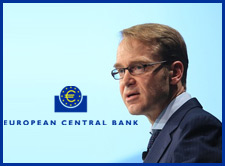U.K. financial institutions stand to lose their "passporting" rights, which allows them to operate free across Europe, if the country opts for a radical exit from the EU, European Central Bank policymaker and Bundesbank Chief Jens Weidmann said.
In a joint interview given to several European newspapers, including the British daily Guardian and the German newspaper Sueddeutsche Zeitung, and published Monday, Weidmann said, "Passporting rights are tied to the single market and would automatically cease to apply if Great Britain is no longer at least part of the European Economic Area(EEA)."
Passporting rights are crucial for British financial institutions, many of whom operate from London and provide services across the EU. These rights eliminate the need for individual licenses to operate in different European countries.
The "hard" Brexit route touted by some Conservatives aims to sever all trading ties with the EU and end free movement between the country and the remaining 27 members.
Losing passporting rights could deal a severe blow to London's status as a financial services hub and many institutions would consider relocating their headquarters, Weidmann said.
"As a significant financial centre and the seat of important regulatory and supervisory bodies, Frankfurt is attractive and will welcome newcomers," the ECB rate-setter told the Guardian.
"But I don't expect a mass exodus from London to Frankfurt."
He also cautioned against concluding that the negative shock on the U.K. economy from the Brexit was less severe than earlier thought.
"Britain hasn't even applied to leave yet," he said, adding that severing the close ties that the U.K. enjoys with the EU and Germany could suppress growth in the former.
On monetary policy, Weidmann reiterated his warning that the longer low interest rates remain, the bigger the risks. He also expressed concern that the ECB could face a conflict of interests while performing the dual duties of setting monetary policy and banking supervision.
"Central bankers are increasingly under pressure to solve all sorts of problems that extend way beyond monetary policy," Weidmann said.
"After Brexit, everyone turned immediately to the central banks and relied on us to calm the waves and give politics the time to sort itself out."
Regarding public finances in Eurozone, Weidmann said budgetary consolidation was of extreme importance for Italy, given its high public debt and also to avoid creating doubts over the sustainability of debt.
Quizzed if he would succeed Mario Draghi as the ECB President, Weidmann replied that such discussions were out of place.
by RTT Staff Writer
For comments and feedback: editorial@rttnews.com
Economic News
What parts of the world are seeing the best (and worst) economic performances lately? Click here to check out our Econ Scorecard and find out! See up-to-the-moment rankings for the best and worst performers in GDP, unemployment rate, inflation and much more.





